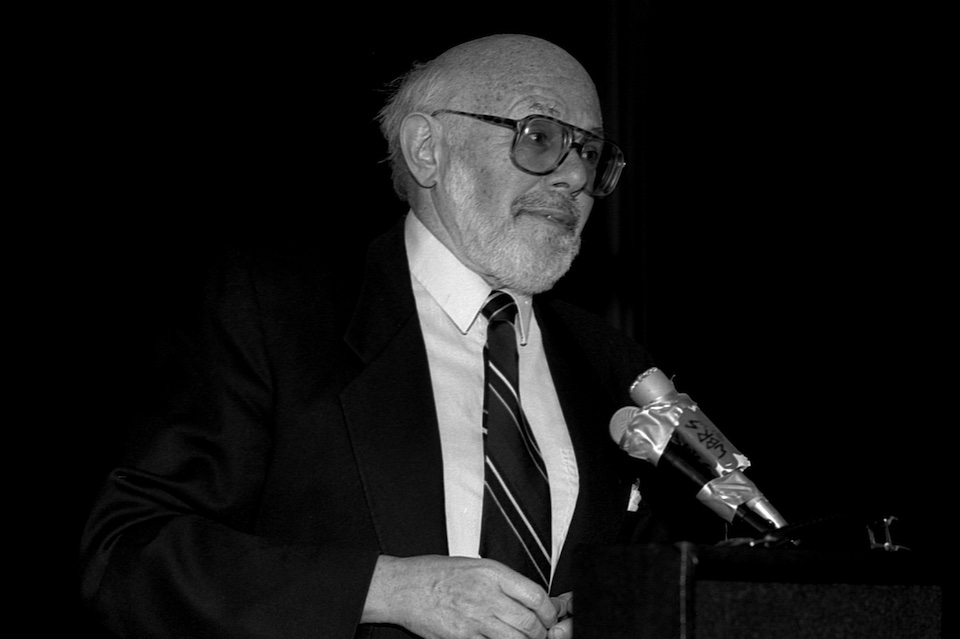‘He had students on the edge of their seats’

Photo Credit: Robert D. Farber University Archives and Special Collections, Brandeis University
By Stephen Whitfield, PhD’72
November 6, 2023
For 44 years, Jacob “Jerry” Cohen (1935-2023) was my American studies colleague, and a legendary teacher who influenced decades of students.
In early 1972, Jerry was scouting for prospective candidates to join the fledgling department. With a newly minted PhD, I was chosen to join the roster, and Jerry was kind enough to let me co-teach the introductory course that fall. Thus he broke me in to the eclectic style of exploring the American experiment at Brandeis, and I could observe up close Jerry’s own pedagogical approach.
It was unfailingly scintillating, argumentative, wide-ranging and self-referential, presumably to expose students to the vibrancy of ideas that can have consequences in daily life. During that first fall semester, which initiated my own career at Brandeis, I was granted the opportunity to appreciate how Jerry succeeded in exerting so huge an impact on so many undergraduates.
How many? In his later years, my colleague claimed to have taught larger classes than anyone in the history of Brandeis. University Registrar Mark Hewitt can back up that claim. He told me that no one else has come close, while cautioning that enrollment statistics are unavailable before 1987. However, because only about 200 underclassmen started in 1948, with Brandeis’ first class, and because decades were needed to reach the size of the classes in the 1980s, Jerry’s primacy is incontestable.
Beginning in 1960 (in the history department) and ending only with his retirement in 2017, with three years away while he worked in New York for the Congress of Racial Equality, Jerry was embedded in countless campus institutions. They ranged from the Faculty Senate to the Brandeis National Committee, from the nationwide string of alumni clubs to the support of Division III athletics. He seemed to be ubiquitous. Once, when I asked the chairperson of our department about Jerry’s absence from our scheduled meeting, the explanation made sense in a metaphoric way: “He’s teaching. He’s always teaching.”
His up-close-and-personal effect upon undergraduates should be put in qualitative terms, too. Steven B. Lichtman ’90, GSAS PhD’04, recalled “the twinkling dancing in Jerry’s eyes” when he realized that his students had grown in learning and in wisdom.
“Knowing that Brandeis is dedicated to that nurturing spirit from its faculty is what attracted us to this school in the first place,” Steven remembered. “Jerry Cohen’s classroom became a formative space for thousands of students interested in his insights about the dynamics of conspiracy theories and the place of sports in American civic life.”
Judith Lupatkin Bernstein ’05, called him “a true Brandeis institution,” who, she assumed, “would live forever, telling future Brandeisians his stories from decades long ago.”
When she told friends and family that she was attending Brandeis, everybody “asked me if I was taking a Jerry Cohen class.” In Jerry’s classes, she learned about the distinctiveness of American civilization; and in re-reading her notes after the news of his death, she was struck by his candor and encouragement. “At times he disagreed with what I had to say, and yet he also gave me high marks. He wrote on those papers that he enjoyed my work and looked forward to reading more from me.”
She added, “He has forever shaped how I approach the world.”
Jerry “taught with a dramatic narrative style that grabbed the attention of every student from first lecture to last,” said Lori Berman Gans ’83, Heller MMHS ’86. “‘Jerry’ was all you needed to say when someone asked what class you were heading off to next. It was always enough. His classes were accessible, riveting (and entertaining) fixtures on the list of classes available for prospective first-years to sit in on each spring during accepted student visiting days, and surely helped close the deal for more than a few generations of Brandeisians.”
Jonathan Krasner ’88, GSAS PhD’02, called his teacher (and future colleague) “a master performer, and his shows invariably played to packed houses when I was an undergraduate in the mid-1980s.”
“Acknowledging Jerry’s thespian talents is in no way to belittle him,” Krasner explained. “Whether he was taking you through the frames of the Zapruder film and the trajectory of the so-called magic bullet, or recounting Whittaker Chambers and Alger Hiss’s pumpkin-spiced spy craft, he had students on the edge of their seats. Jerry cultivated many students’ interest in American studies by reminding them of Mark Twain’s 1897 maxim, “Truth is stranger than fiction, because fiction is obliged to stick to possibilities. Truth isn’t.”
May Jerry Cohen’s memory be for a blessing.
Stephen J. Whitfield is the Max Richter Professor of American Civilization, Emeritus, and the author of “Learning on the Left: Political Profiles of Brandeis University."